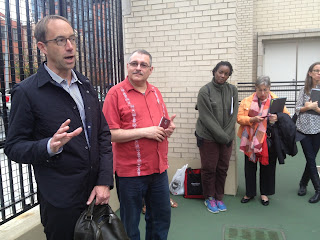This moving letter, reprinted with the permission of its author who asked for his name to be removed, was sent to NY Commissioner of Education Betty Rosa and top NYSED officials. It was sent shortly after he had participated in a online discussion of stakeholders, whose views were solicited to give feedback on state regulations to enforce the NY state Substantial Equivalency law. The message points out how the lack of a basic secular education threatens not only the life chances of Hasidic youths, but also the health and safety of their communities.
For more on this issue, see recent opeds by Naftuli Moster of Yaffed in the Washington Post and Gotham Gazette, the latter entitled What Happens in Williamsburg Doesn't Stay in Williamsburg.
Dear Commissioner Rosa, Deputy Commissioner D’Agati, Assistant Commissioner
Coughlin, and members of the Board of Regents,
I also want to thank you for addressing this important issue as well as echo
and elaborate on many of the points made by others.
I was raised in the Hasidic, Jewish community in Williamsburg, Brooklyn and
attended a Hasidic yeshiva until the age of 15. In my Hasidic elementary and
middle school (cheider), after an intense day of religious studies, we had only
an hour-and-a-half of very rudimentary English and arithmetic. In Hasidic high
school, during my thirteen hours in yeshiva daily, we exclusively studied
religious texts such as the Talmud and Torah and no secular studies whatsoever.
Throughout all my years in a Hasidic school, I was never taught any science,
history, geography, government, art, literature, computers, health or any math
beyond arithmetic.
The school I attended and its disregard for a secular education is not in any
way an isolated case. It is the universal norm among Hasidic boys schools in
New York. (The girls generally do receive a better secular education, since in
ultra-Orthodox Judaism they are forbidden from studying the Talmud and cannot
become rabbis.)
The result: I could not write a paragraph in English despite being the third
generation in my family living in New York City. I did not know how to add
simple fractions despite being a top student in my class and attending a 13 hour
school day.
I was fortunate and was eventually able to drop out of my Hasidic yeshiva in
pursuit of a secular education. However, that came at the immense social and
emotional cost of losing my childhood friends and being viewed as a black sheep
within my family and childhood community.
Others in the community are not as fortunate.
Go into a doctor’s office in my childhood neighborhood of Williamsburg, and you
will see Hasidic men having to call their wives on the phone to confirm their
English date of birth or to act as translators so they can understand the
doctor’s diagnosis.
My bright Hasidic friend had to call me periodically when he began working in
construction to help him with simple calculations when he was ordering
equipment.
So many of my family and childhood friends know virtually nothing about the
history of their country. They’ve never heard of the Civil War, the Bill of
Rights, or the term “civil rights.” They live in one of the world’s most
diverse cities and still know nothing about the history or culture of any of
their non-Jewish neighbors.
But the lack of basic scientific knowledge has even more dire consequences.
My stepfather sadly passed away from Covid-19 in March. He was 42 years old,
with no prior health conditions; it was a terrible loss. After his funeral, I
was shocked to see many attendees crowding together indoors and with no masks.
These were people I love and respect, people who are generally caring and
responsible, people who value life and each other.
Watching them, I realized
that with no basic understanding of science it truly can be unintuitive for
someone to follow the guidance of medical experts. If you’ve never before heard
the term “biology”, “cell” or “microscopic”, any baseless conspiracy theory
about the virus can make just as much sense as a scientific one. I realized
that the lack of secular education, in addition to causing severe community
economic hardships, unfortunately is also partially responsible for such
devastating loss of life.
During the recent stakeholder engagement meetings, I felt that my voice and my
story, and those of so many others affected by the lack of secular education
within the Hasidic community, were not sufficiently relayed.
While it is easy to focus on positive stories and also important to focus on
improvements, no true change can be achieved without explicitly acknowledging
and addressing the problems. For regulations to be effective, the wrong they
are hoping to remedy cannot be glossed over. Only by acknowledging the mistakes
of today can we hope for a better, improved tomorrow.
I hope that you will take the stories of hardships faced by so many raised
within the Hasidic community, the facts about the continued educational neglect
within Hasidic yeshivas, and the spirit of hope for positive, meaningful change
into account when making decisions about the new regulations, so that no child
will continued to be deprived of basic skills they need for their future and
well-being.
Sincerely, [name removed]

















